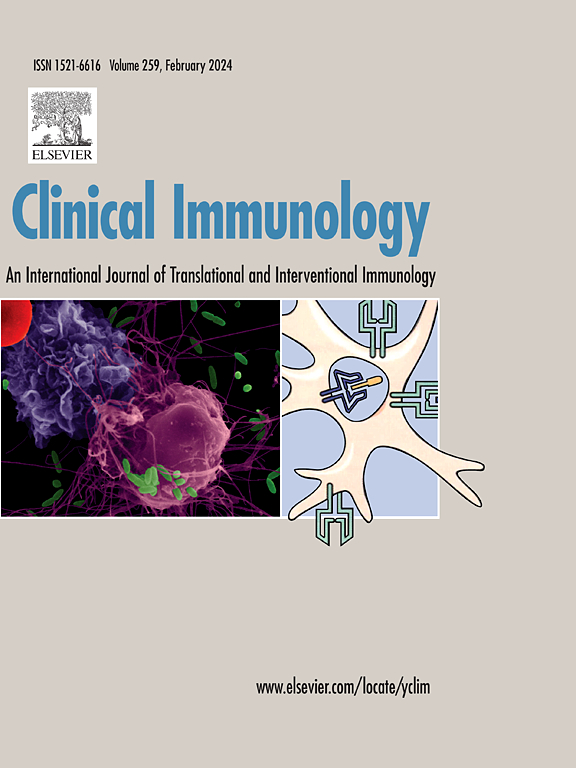通过全基因组关联研究和多基因风险评分分析,确定台湾汉族人群中原发性斯约格伦综合征的特征。
IF 4.5
3区 医学
Q2 IMMUNOLOGY
引用次数: 0
摘要
背景:斯约格伦综合征(SS)是一种自身免疫性疾病,主要影响外分泌腺,导致粘膜干燥和全身表现。本研究旨在通过基于医院的全基因组关联研究(GWAS)和多基因风险评分(PRS)分析,确定台湾汉族人群中与原发性萨氏综合征(pSS)相关的遗传标记,以解决遗传研究缺乏的问题:这项研究包括 11,390 名确诊为 pSS 的患者和 113,900 名对照者。GWAS 发现了一个已知基因位点和八个新基因位点。已知的 HLA 等位基因(包括 HLA-DRB1*15:01 和 HLA-DQA1*03:01)以一致的效应方向被成功复制。PRS分析表明,几种自身免疫性疾病与pSS具有相似的遗传背景:本研究是迄今为止关于台湾汉族人群中 pSS 遗传学的最大规模队列研究。我们的研究结果为 pSS 的发病机制提供了有价值的见解,并强调了其作为一种自身免疫性疾病的相关并发症。本文章由计算机程序翻译,如有差异,请以英文原文为准。
Characterization of primary Sjögren's syndrome in the Taiwan Han population through a genome-wide association study and polygenic risk score analysis
Background
Sjögren's syndrome (SS) is an autoimmune disorder that primarily affects the exocrine glands, leading to dryness of mucous membranes and systemic manifestations. This study aimed to identify genetic markers associated with primary SS (pSS) in the Taiwan Han population through a hospital-based genome-wide association study (GWAS) and polygenic risk score (PRS) analysis, addressing the lack of genetic research.
Results
This study included 11,390 patients diagnosed with pSS and 113,900 controls. GWAS identified one known locus and eight novel loci. Known HLA alleles, including HLA-DRB1*15:01 and HLA-DQA1*03:01, were successfully replicated in a consistent effect direction. PRS analysis revealed that several autoimmune diseases share similar genetic backgrounds with pSS, including rheumatoid arthritis and systemic lupus erythematosus.
Conclusion
This study represents the largest cohort to date on the genetics of pSS in the Taiwan Han population. Our findings provide valuable insights into the pathogenesis of pSS and emphasize the comorbidities associated with it as an autoimmune disease.
求助全文
通过发布文献求助,成功后即可免费获取论文全文。
去求助
来源期刊

Clinical immunology
医学-免疫学
CiteScore
12.30
自引率
1.20%
发文量
212
审稿时长
34 days
期刊介绍:
Clinical Immunology publishes original research delving into the molecular and cellular foundations of immunological diseases. Additionally, the journal includes reviews covering timely subjects in basic immunology, along with case reports and letters to the editor.
 求助内容:
求助内容: 应助结果提醒方式:
应助结果提醒方式:


